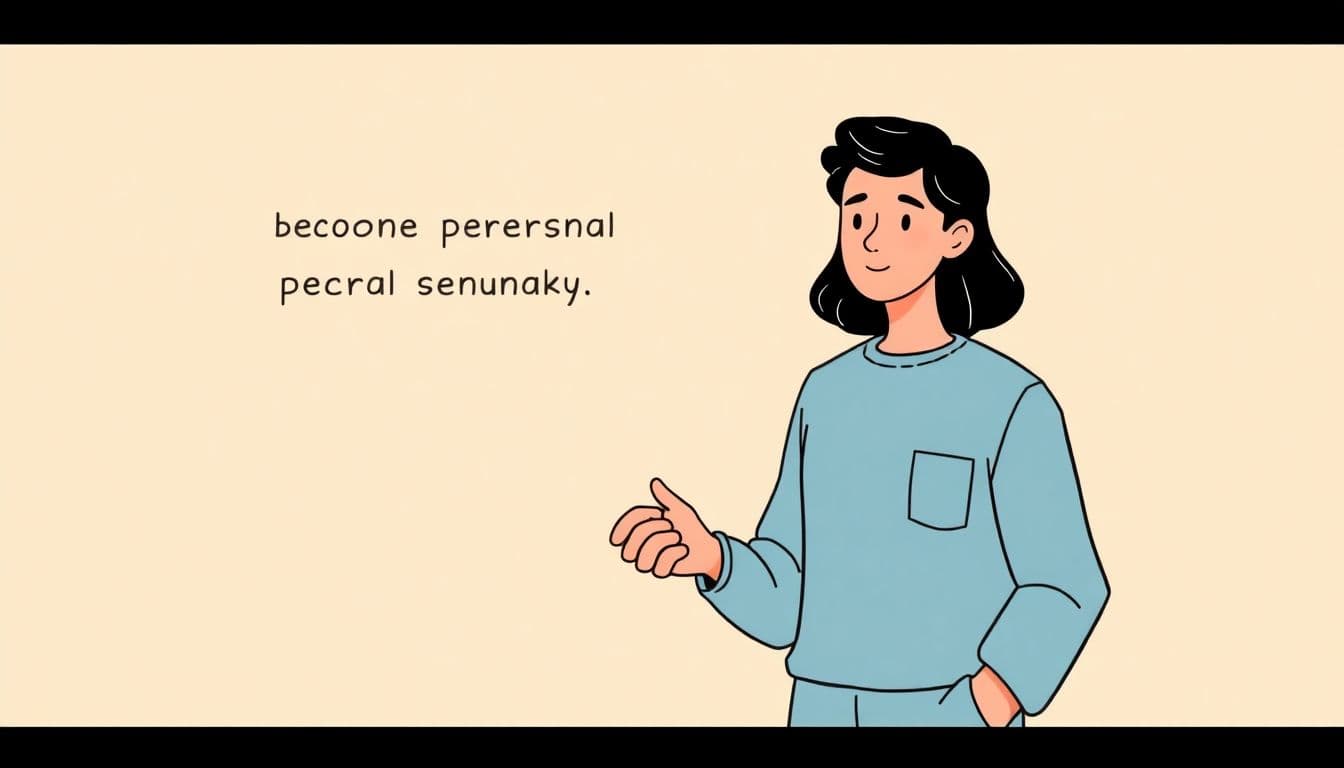Table of Contents
Have you ever found yourself flipping to the back cover of a book or clicking on a movie description to get a quick idea of the plot? That’s where you encounter a synopsis. “What does synopsis mean?” you might wonder.
Simply put, it’s a brief overview of a story’s main points, designed to give you a snapshot without spoiling the whole experience. A well-crafted hooks your interest and gives you a taste of the narrative.
Understanding the art of the writing synopsis is essential not just for those aiming to captivate their audience but also for readers and viewers presented with so many options in literature and media. It’s a skill that distills the essence of a story into a few compelling paragraphs.
What Does Synopsis Mean
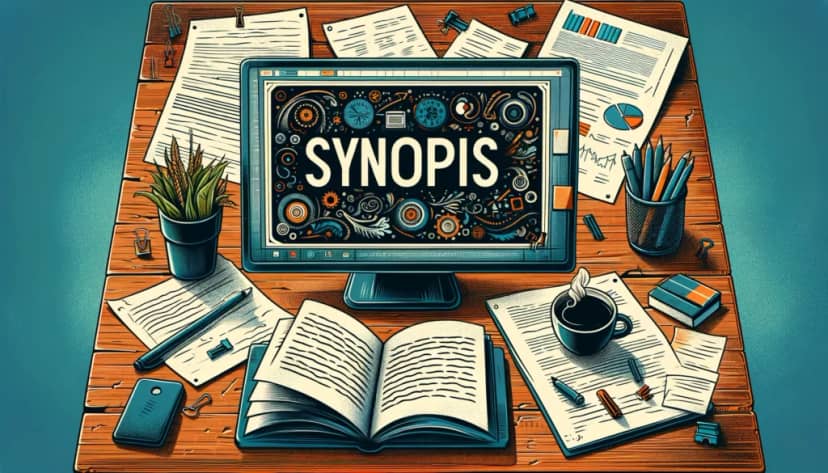
A synopsis is essentially a concise version of a story that provides an overview of the main plot points, characters, and themes without giving away the detailed narrative. It serves as a roadmap of sorts, offering readers or viewers a glimpse of what to expect.
The term itself originates from Greek, where it means “general view” or “summary,” which perfectly encapsulates its purpose in today’s use across various mediums.
The primary purpose of a synopsis is to inform and engage potential readers or viewers, giving them enough information to spark interest without giving away key surprises or plot twists.
In the publishing world, a synopsis is often a critical component of a book proposal, helping agents and publishers quickly assess a manuscript’s content and potential appeal.
For movies and television, a synopsis might be used in promotional materials to attract audiences.
In literature, a well-written synopsis can mean the difference between a manuscript getting picked up for publication or passed over. In academia, a research synopsis provides a clear overview of a study’s aims, methods, and conclusions, aiding in the dissemination of knowledge. For the general public, a synopsis helps in making informed choices about which books to read, movies to watch, or research to delve into further, based on personal interest and time availability.
Essentially, it’s a versatile tool that bridges the gap between creators and their audience, facilitating communication and understanding across diverse fields.
Types of Synopses
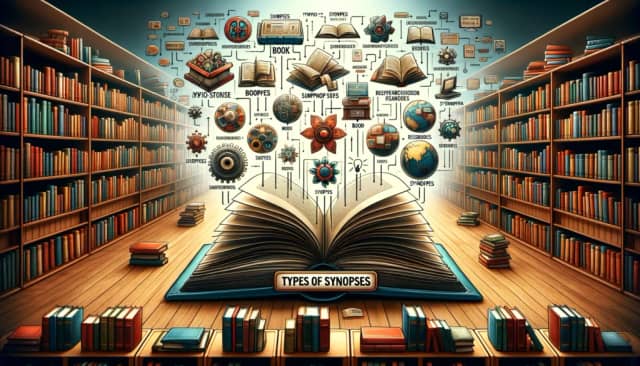
Synopses come in various forms, each created for different mediums and audiences. Let’s dive into the main types you’re likely to encounter:
- Book Synopses: These are crucial in the literary world, serving multiple purposes. For authors and publishers, a book synopsis is often part of the submission package to agents and publishers. It provides a detailed overview of the plot, including character arcs and key events, without needing the reader to go through the entire manuscript. For readers, a shorter version might appear on the book’s back cover or inside flap, designed to entice without spoiling major plot points.
- Movie Synopses: Similar to their literary counterparts, movie synopses give potential viewers a glimpse of the film’s storyline. They’re used in promotional materials, like posters and websites, to capture the essence of the movie. A good movie synopsis balances intrigue with information, offering enough detail to attract interest while preserving the film’s surprises.
- Research Synopses: In academic and scientific circles, a research synopsis, or abstract, summarizes the scope, objectives, methods, results, and conclusions of a study. It’s a tool for scholars to quickly discern the relevance and significance of research without reading the entire paper. This type of synopsis is essential for navigating academic journals and deciding which articles to read in full.
Despite their differences, all synopses share a common goal: to provide a concise, engaging overview that informs and interests their intended audience.
How to Craft a Compelling Synopsis
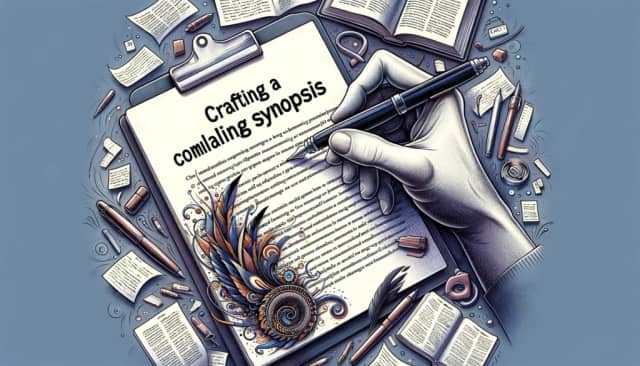
Creating a compelling synopsis is both an art and a science. It requires distilling the essence of your work into a brief, engaging narrative that captures the interest of your audience. But you still have to pay attention to not giving away too much.
Here are some tips and strategies to help you write an effective synopsis:
- Start with a Strong Hook: Begin your synopsis with a sentence or two that grabs attention. This could be an intriguing plot point, a question, or a statement that sets the tone of your work. The goal is to make the reader want to know more.
- Clearly Identify the Main Characters: Focus on introducing the protagonist and, if necessary, the antagonist. Briefly describe who they are, their goals, and the challenges they face. This helps establish the emotional core of your story.
- Outline the Plot: Provide a clear overview of the story’s main events, focusing on the journey of the protagonist. Avoid going into too much detail about subplots unless they’re crucial to understanding the main narrative. Remember to include both the setup and the resolution, giving a sense of completeness.
- Highlight the Conflict: Every compelling story has a central conflict. Make sure your synopsis clearly communicates what’s at stake for the main characters and what obstacles they must overcome. This is what drives the narrative forward.
- Maintain the Tone of Your Work: If your book or movie is humorous, let some of that humor shine through in the synopsis. If it’s a thriller, maintain the suspense. The tone of your synopsis should reflect the tone of the work itself, giving readers an accurate feel for what to expect.
- Keep It Concise: A synopsis should be brief, usually no more than one to two pages long for a book and even shorter for a movie. Focus on the essentials and avoid unnecessary details that could dilute the impact of your synopsis.
- Polish and Proofread: Like any piece of writing, your synopsis should be well-crafted and free of errors. Proofread it carefully to ensure it’s clear, coherent, and grammatically correct. A polished synopsis speaks volumes about your professionalism and dedication to your craft.
Writing a compelling synopsis is about providing enough detail to interest your audience, and keeping some elements under wraps to spark curiosity.
Synopsis vs. Summary
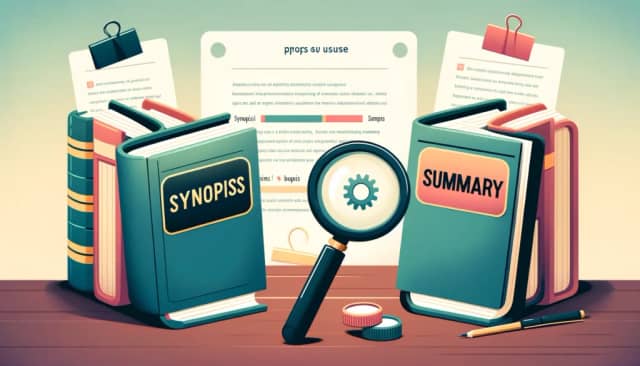
Understanding the distinction between a synopsis and a summary is crucial for writers across various fields. While both serve to condense longer works into more digestible forms, their purposes and uses differ significantly.
- A synopsis is a detailed overview of a work that includes all major plot points, including the ending. It’s primarily used in the publishing and film industries as a tool for agents, publishers, and producers to evaluate the potential of a manuscript or screenplay. A synopsis aims to showcase the narrative arc, character development, and unique aspects of the story, often as part of a pitch or proposal. It’s about conveying the essence and appeal of the story, including how conflicts are resolved, to someone who decides on its publication or production.
- A summary is a brief recounting of a work’s main points, designed for an audience already familiar with the material. Summaries are often found in academic contexts, book reviews, or as part of study guides, providing a quick reference to the story’s key events without necessarily revealing the ending. The focus is on condensation rather than persuasion, allowing readers to recall the work’s main themes and plot without the detail required in a synopsis.
The key difference lies in their intent: a synopsis seeks to sell or explain the entire narrative, including how it unfolds and concludes, to someone who’s not yet familiar with the work. A summary, however, is more about reflection or review, offering a condensed version without the necessity of revealing how the story concludes.
When to use each depends largely on your goal.
If you’re aiming to get a novel published, a screenplay produced, or provide a comprehensive overview that includes the resolution, a synopsis is what you need.
If your purpose is to review, study, or discuss a work without spoiling it for those who might not know the ending, then a summary is more appropriate.
The Role of a Synopsis in Publishing
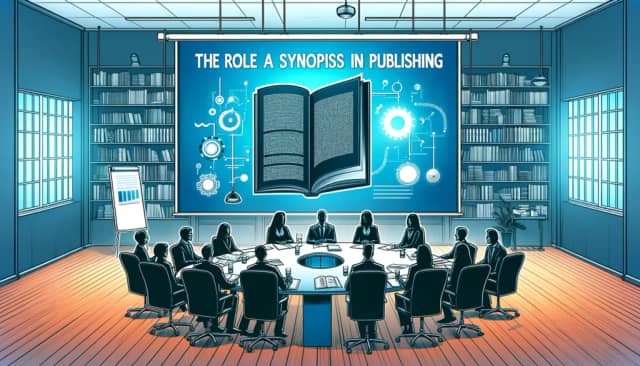
In the publishing industry, a synopsis plays a critical role, particularly during the book submission process and in the marketing of a book. Its importance can’t be overstated, as it often serves as the first introduction of a manuscript to agents and publishers.
A well-crafted synopsis can make the difference between a manuscript being noticed or overlooked.
- During Book Submissions: When authors submit their manuscripts to publishers or literary agents, a synopsis is typically required as part of the submission package. This document allows agents and publishers to quickly understand the plot, themes, character arcs, and the narrative’s overall trajectory. A compelling synopsis can pique the interest of a publishing professional, convincing them that the manuscript is worth a closer examination. Essentially, it acts as a sales pitch, highlighting what makes the story unique and why it would appeal to readers.
- In Marketing: Once a book is accepted for publication, the synopsis can also be a valuable tool in creating marketing materials, such as the book’s description on the back cover or an online retailer’s product page. While the marketing copy may be more promotional and less detailed than the original synopsis, the essence of the synopsis informs how the book is positioned and promoted to potential readers. It helps define the target audience and can guide the creation of press releases, catalog descriptions, and promotional content across media platforms.
The synopsis also aids in cataloging and metadata management, providing essential information that helps categorize the book within the correct genre and themes for bookstores and libraries.
This categorization is vital for ensuring the book reaches its intended audience and is discoverable by readers interested in similar subjects.
In essence, the synopsis serves both as a critical component in the initial stages of manuscript submission and as a foundational element in the book’s subsequent marketing strategy.
Its ability to concisely convey the essence of a book makes it indispensable for authors looking to capture the attention of the publishing world and for publishers aiming to connect books with their ideal readers.
Common Mistakes to Avoid
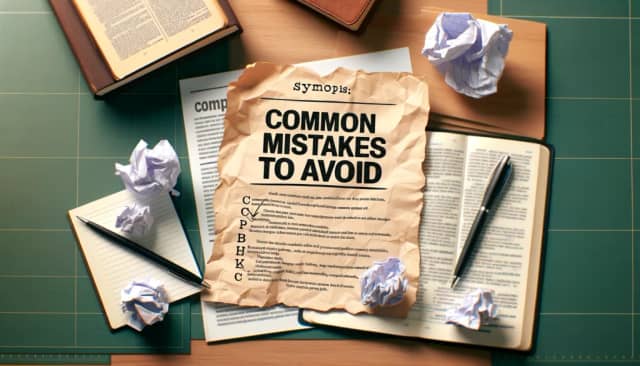
Writing a synopsis can be challenging, and there are several common pitfalls that writers often encounter.
By being aware of these, you can craft a synopsis that effectively captures the essence of your work without falling into these traps.
- Being Too Vague: One of the most common mistakes is not providing enough detail about the plot and characters. While you want to avoid spoilers, it’s important to give a clear overview of the story arc and what drives the characters. Avoid generalities and include specific plot points and character motivations to give agents and publishers a good sense of your story.
- Including Too Much Detail: On the flip side, including too much detail can overwhelm the reader and dilute the impact of the major plot points. Focus on the main storyline and key characters, and omit subplots unless they are crucial to understanding the main plot or character development.
- Losing the Narrative Voice: A synopsis should not only convey the plot but also the tone and style of your writing. Keeping the narrative voice consistent in the synopsis can give readers a taste of your writing style and help maintain interest.
- Forgetting the Ending: Sometimes, writers may omit the ending in the synopsis to avoid spoilers. However, agents and publishers expect the synopsis to reveal how the story concludes to assess the manuscript’s full arc and potential. Ensure your synopsis includes a clear and concise ending.
- Overusing Jargon or Clichés: While it’s important to convey the essence of your story, relying too much on genre clichés or jargon can make your synopsis feel generic. Use clear and compelling language that reflects the uniqueness of your story.
- Neglecting the Format: A disorganized or poorly formatted synopsis can be off-putting to readers. Stick to a clear structure, use concise paragraphs, and ensure your synopsis is easy to read. Typically, a single-spaced page with standard margins and font size is expected.
- Not Proofreading: As with any professional document, typos, grammatical errors, and awkward phrasing can detract from the quality of your synopsis. Proofread carefully or consider having someone else review your synopsis to catch any mistakes you may have missed.
Avoiding these common mistakes can make your synopsis stronger and more effective, increasing the chances of capturing the interest of agents, publishers, and ultimately, readers.
Conclusion
Understanding what does synopsis mean takes us beyond simply seeing it as a summary. A synopsis is a crafted narrative that conveys the essence, structure, and soul of a story, whether it’s for a book, a movie, or a research project. Crafting a synopsis that captures interest and provides a clear overview of your work is a skill that benefits authors, researchers, and creators across various fields.
The journey from drafting a synopsis to seeing it fulfill its role in publishing, marketing, or academic research underscores its importance. A well-written synopsis opens doors, makes connections, and starts conversations. It’s the first step in sharing your story with the world, making it an invaluable tool in your writing and publishing toolkit.
FAQ
Is a synopsis just a summary?
While a synopsis does summarize a story, it’s more detailed than a basic summary. It covers the entire narrative, including the ending, and is used to pitch a manuscript to publishers or agents, differing from a summary that merely condenses the plot without revealing the conclusion.
Is synopsis long or short?
A synopsis should be concise yet comprehensive enough to cover the main plot and character arcs of a story. While it’s typically shorter than the work it describes, it’s detailed enough to provide a clear overview, usually ranging from one to two pages.
Can a synopsis be 2 pages?
Yes, a synopsis can be two pages long, especially for complex works that require more detail to adequately convey the plot and character development. The key is to remain concise while thoroughly outlining the story’s arc and resolution.
How to make a synopsis?
To make a synopsis, start by outlining the main plot points and character arcs. Include the beginning, middle, and end of the story, focusing on the conflict and resolution. Keep the narrative voice consistent, and ensure it reflects the tone of your work. Be concise, clear, and compelling.
How do you start a synopsis?
Start a synopsis with a strong hook that captures the essence of your story. Introduce the protagonist and the central conflict early on. Set the tone and style of your work in the opening sentences to engage your readers and give them a taste of what to expect.



